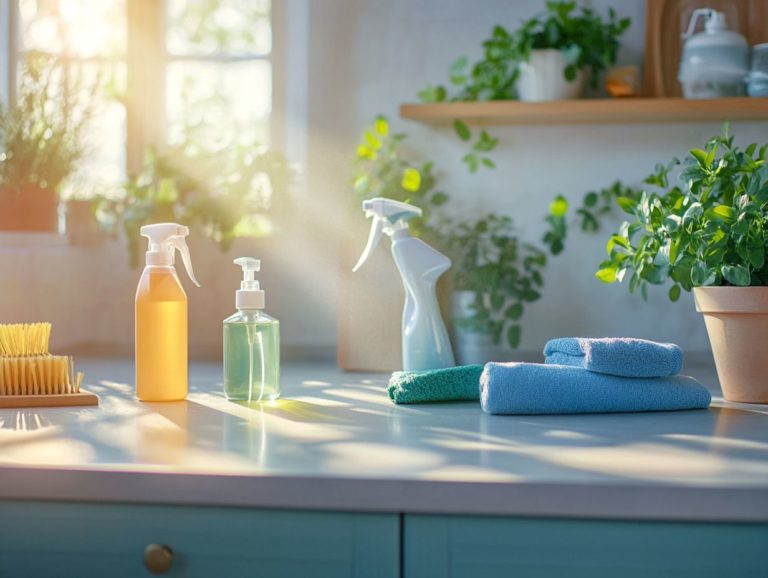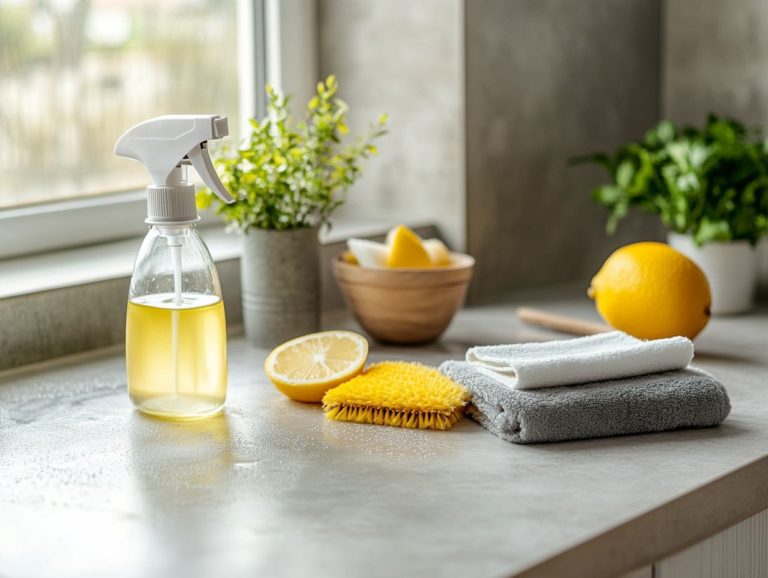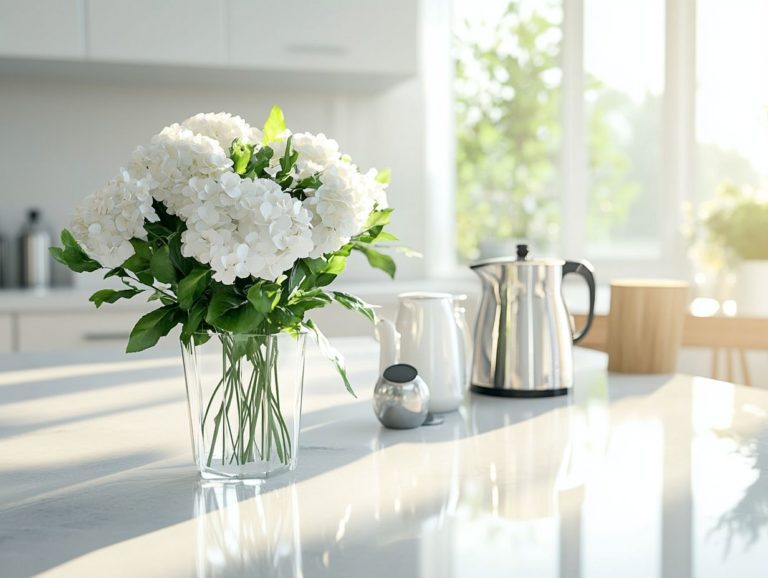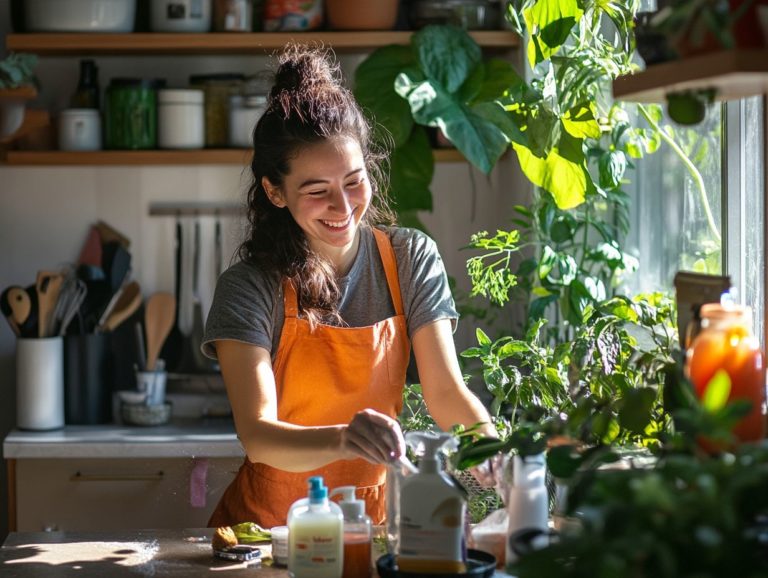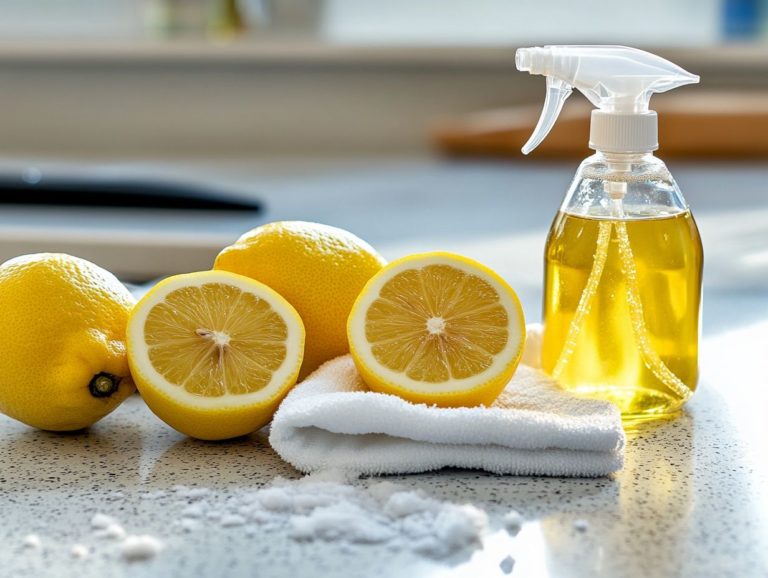Is Vinegar Safe for All Surfaces?
Vinegar is a remarkable household staple known for its great cleaning skills. But is it safe for every surface in your home?
This article looks at vinegar, its effectiveness as a cleaner, and the possible risks involved. You ll discover which surfaces benefit from this natural solution and which ones to avoid.
You ll also find useful tips on how to use vinegar safely and effectively. This way, you can harness its full cleaning potential without damaging your belongings.
Contents
- Key Takeaways:
- What is Vinegar?
- Is Vinegar Safe to Use on All Surfaces?
- What are the Benefits of Using Vinegar as a Cleaner?
- Potential Risks of Using Vinegar on Surfaces
- How Should Vinegar Be Used for Household Cleaning?
- Frequently Asked Questions
- Expert Advice from Jolie Kerr and Caylin Harris
- Is Vinegar Safe for All Cleaning Surfaces?
- What types of surfaces can vinegar be used on?
- Are there any surfaces that should not be cleaned with vinegar?
- Is vinegar safe to use around children and pets?
- Can vinegar damage surfaces over time?
- Are there precautions to take when using vinegar?
Key Takeaways:
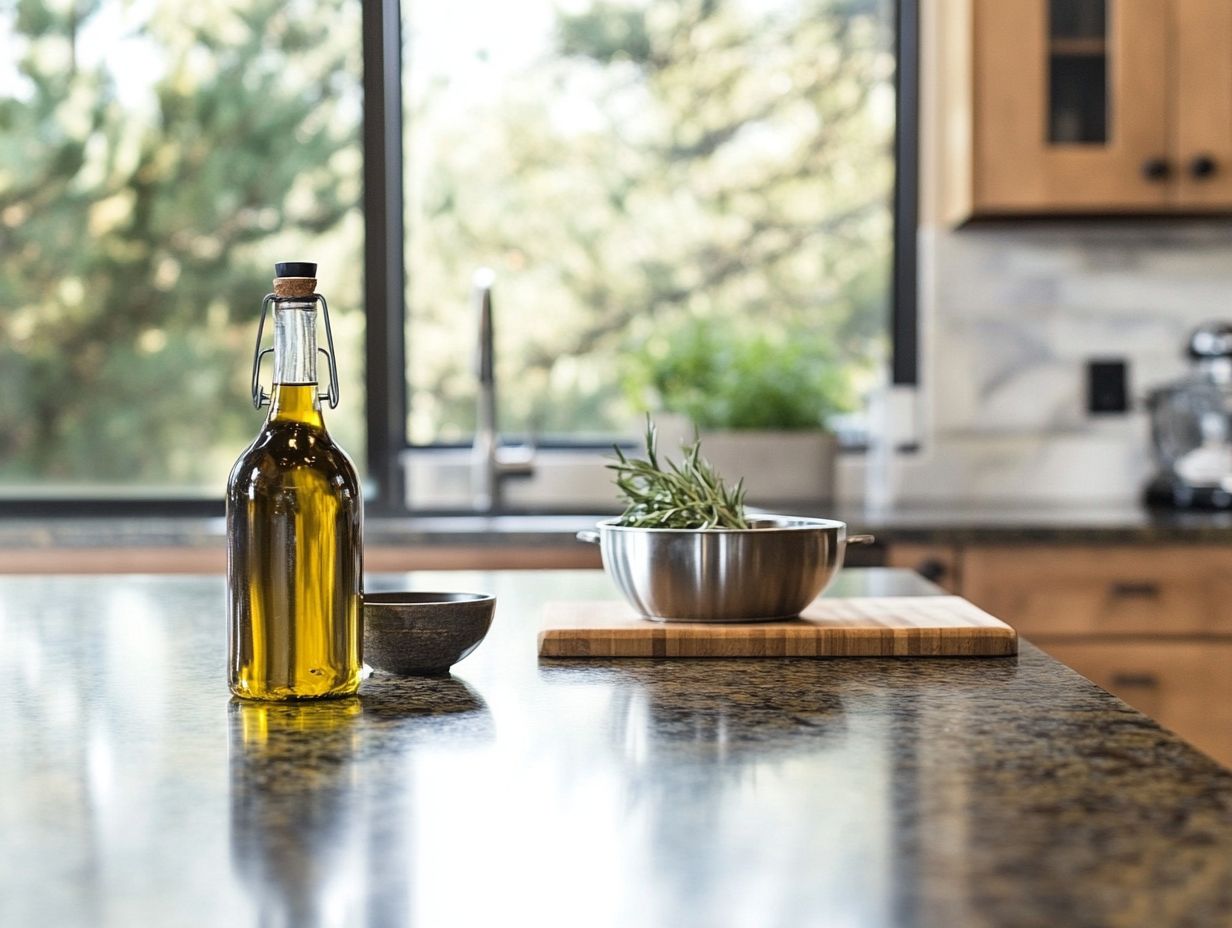
- Vinegar is a natural and effective cleaner for most surfaces.
- Avoid using vinegar on granite and marble, as it can cause damage.
- Diluting vinegar with water or adding other ingredients can enhance its cleaning power.
What is Vinegar?
Vinegar, especially distilled white vinegar, is a versatile and highly regarded cleaning agent. It’s known for its non-toxic qualities and effectiveness for various cleaning tasks.
This natural cleaner comes from the fermentation process, making it a favorite for anyone wanting to create DIY cleaning products that are safe for the environment and gentle on your home.
Its acidity helps break down grime, remove stains, and disinfect surfaces. This makes vinegar an exceptional choice for many cleaning tasks.
Is Vinegar Safe to Use on All Surfaces?
When considering vinegar as a cleaning agent, know that it s a natural and non-toxic option. However, it may not be suitable for all surfaces, especially delicate ones like marble and granite.
The acidity of vinegar can potentially harm certain surfaces, causing discoloration or scratches over time. Understanding where and how to use vinegar helps you clean effectively without causing damage.
What Surfaces Can Vinegar Be Used On?
Vinegar is a versatile cleaning agent that you can safely use on many surfaces. Surfaces like stainless steel, glass, and rubber gaskets benefit from its natural cleaning properties.
To use vinegar, dilute it with water in a 1:1 ratio. For stainless steel appliances, a microfiber cloth dampened with this solution will give a streak-free shine.
For glass surfaces, use a spray bottle filled with diluted vinegar for a crystal-clear finish.
Avoid using vinegar on natural stone surfaces like granite or marble. Its acidity can cause unwanted etching. Plus, vinegar is an economical and environmentally friendly choice for non-toxic cleaning.
For a sparkling clean kitchen, just spray vinegar on your countertops, wipe them down, and finish with a dry cloth. You ll achieve fantastic results without relying on harmful chemicals.
Start using vinegar today for a cleaner and greener home! Share your experiences with vinegar cleaning!
What Surfaces Should Not Be Cleaned with Vinegar?
While vinegar may be a go-to cleaning solution for many, there are critical surfaces you should never clean with it, as doing so could lead to damage. The acids in vinegar can cause problems on stone surfaces like marble and granite, causing etching and discoloration over time.
Additionally, using vinegar on rubber gaskets can cause degradation and shorten their lifespan. It’s essential for homeowners to recognize where vinegar should be avoided to prevent expensive cleaning blunders.
Certain wood finishes and specific electronic devices also deserve a vinegar-free zone, as the acidity can strip finishes and erode protective coatings. For example, applying vinegar to hardwood floors might leave them dull and damage the finish.
Moreover, exposing electronic devices can lead to corrosion.
Instead, opt for alternative cleaning solutions, such as soapy water for wood surfaces and specialized cleaners for electronics. These alternatives not only maintain the integrity of these surfaces but also provide a thorough clean without the risk of harm to their surfaces.
What are the Benefits of Using Vinegar as a Cleaner?
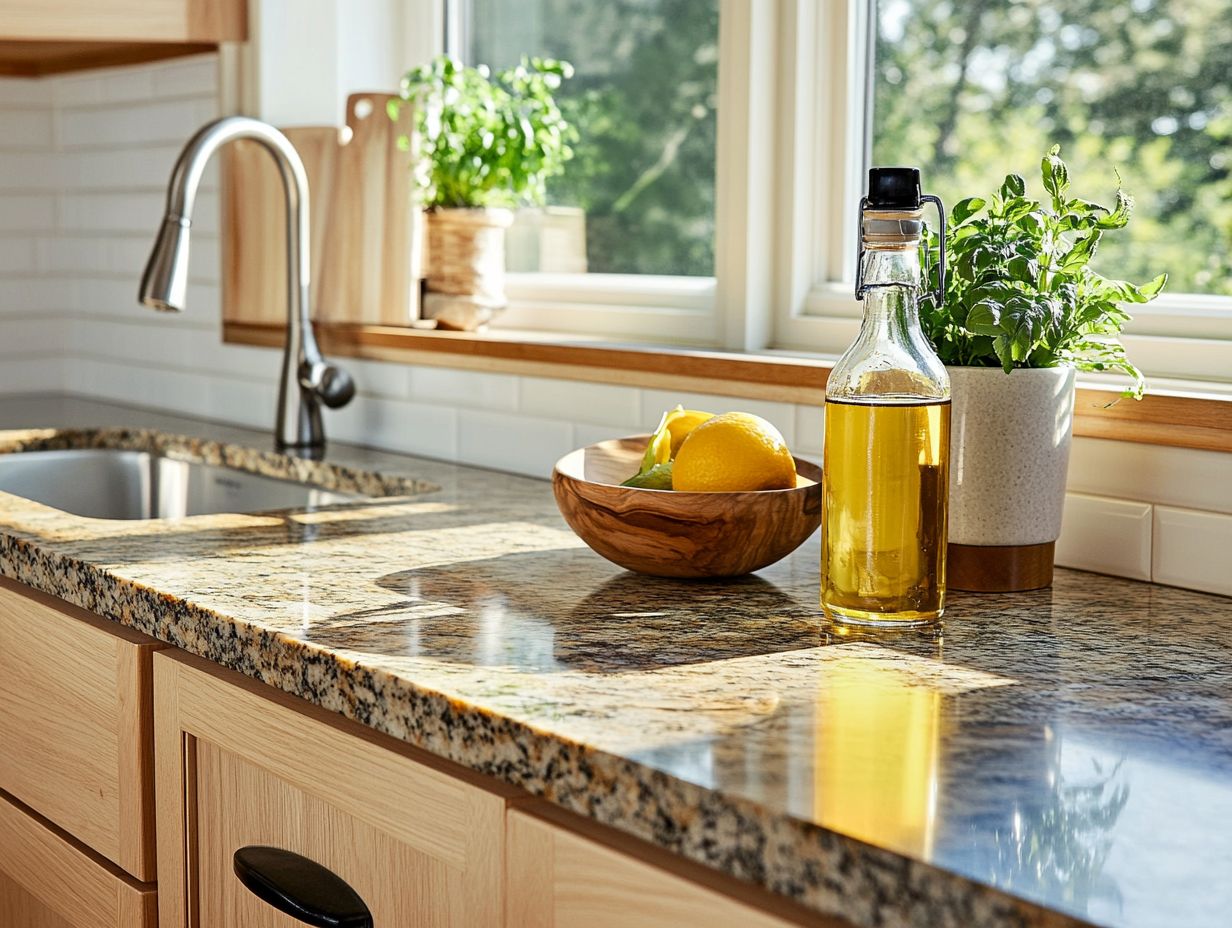
The benefits of using vinegar as a cleaner are both numerous and compelling, positioning it as a favored choice for those who prioritize eco-friendly and effective cleaning solutions.
It serves as a powerful agent, effortlessly cutting through grease and grime while also neutralizing unpleasant odors. Vinegar stands out as a champion in household cleaning.
Its natural composition minimizes risks to health and the environment, establishing it as a superb alternative to harsh chemical cleaners like bleach.
Is Vinegar an Effective Disinfectant?
Vinegar often receives accolades for its disinfectant properties, meaning it can kill germs. However, its effectiveness can fluctuate depending on the specific bacteria or virus you re targeting. While it does boast natural antibacterial qualities, it may not wipe out more resilient pathogens, such as certain strains of E. coli or the flu virus, as effectively as stronger chemical disinfectants.
Therefore, while vinegar can play a role in your cleaning regimen, it’s crucial to recognize its limitations when it comes to achieving thorough sanitization in your home.
To harness the power of vinegar as a disinfectant, don’t forget to grab white distilled vinegar. Mixing it with water in a 1:1 ratio creates a formidable cleaning solution, particularly effective against common germs like Salmonella and Listeria, which can cause food poisoning, making it a fantastic option for kitchen surfaces and cutting boards.
When utilizing this vinegar solution, be sure to let it sit on surfaces for at least five minutes to optimize its germ-killing potential.
You may also consider pairing vinegar with baking soda to amplify its cleaning prowess; just remember that this mixture shouldn t be stored due to the gas released during the reaction.
Incorporating vinegar into a thorough cleaning strategy can offer you a more natural alternative while still effectively addressing various household germ concerns.
Ready to clean smarter? Try vinegar safely in your home cleaning today!
Does Vinegar Leave Behind Residue?
One common concern about using vinegar as a cleaning agent is whether it leaves any residue after application. When used properly and wiped off with a microfiber cloth, vinegar doesn t leave behind any significant residue. This makes it ideal for cleaning surfaces like glass and stainless steel.
However, if you fail to dilute the vinegar or use improper cleaning techniques, you may end up with streaks or spots. Understanding vinegar safety and application methods is important.
For an optimal cleaning experience, adhere to recommended dilution ratios. A mix of one part vinegar to three parts water works well for most surfaces. This not only maximizes your cleaning effectiveness but also minimizes unwanted residue.
Always use a clean, dry microfiber cloth to prevent transferring dirt or oils back onto the surface. Wipe in a circular motion to lift grime and prevent streaking. For stubborn spots, apply the vinegar solution directly to the cloth instead of the surface. This method allows for better control and reduces the chance of excess liquid causing unwanted residue.
Potential Risks of Using Vinegar on Surfaces
While vinegar is celebrated as a household cleaning miracle, know the potential risks to avoid costly mistakes! Its acidic properties can trigger chemical reactions that may damage or etch delicate materials. This is especially true for sensitive surfaces like marble, granite, or certain woods.
Understanding vinegar safety and recognizing which surfaces it may adversely impact is vital for effective cleaning and maintenance.
Can Vinegar Damage Certain Surfaces?
Vinegar can damage certain surfaces due to its acidity, leading to etching or discoloration on porous materials like marble and granite. The chemical makeup of vinegar might compromise the integrity of these surfaces, resulting in permanent damage that diminishes their beauty.
Therefore, identify which surfaces may be affected by vinegar and explore alternative cleaning solutions for those materials. Beyond natural stone, vinegar can also dull finishes on hardwood floors and may cause warping over time. It can strip protective coatings on stainless steel appliances and marble surfaces, leaving streaks and discoloration.
For sensitive surfaces, consider using gentle cleaners or a mixture of soap and water. Always test any cleaning solution on a discreet area first. Maintain surfaces with proper cleaning products specifically formulated for that material to ensure longevity and aesthetic appeal. For instance, use enzyme-based cleaner for pet messes and stains.
Can Vinegar Cause Harmful Chemical Reactions and Cleaning Mistakes?
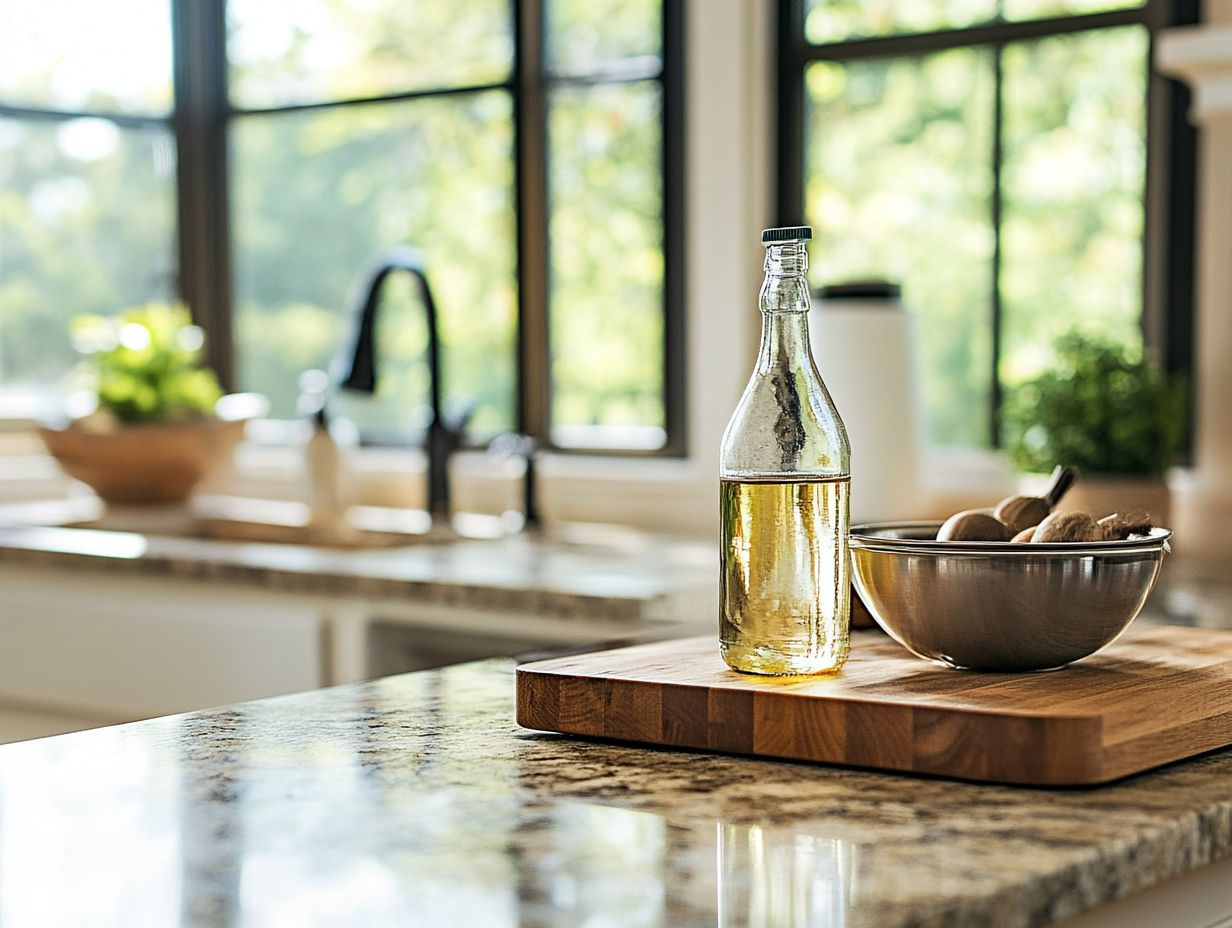
Yes, vinegar can trigger harmful chemical reactions when mixed with certain substances, especially bleach. This can release toxic gases that pose serious health risks. When using vinegar as a cleaning agent, avoid combining it with other products unless you understand their chemical properties and potential interactions.
Mixing vinegar with hydrogen peroxide can inadvertently create peracetic acid, which can irritate your skin, eyes, and respiratory system. Household cleaners often contain various compounds that can react unpredictably with vinegar, leading to harmful byproducts or fumes.
To minimize these risks, read labels thoroughly. When in doubt, test products separately or consult chemical safety resources. Ensure good ventilation when cleaning and wear protective gear to enhance your safety. Enjoy an effective yet hazard-free cleaning experience!
Start using vinegar wisely today for a spotless home!
How Should Vinegar Be Used for Household Cleaning?
Using vinegar for household cleaning is an effective strategy, but it necessitates a grasp of the proper techniques and methods, including cleaning tips and avoiding cleaning mistakes.
To truly unlock its potential, you should create effective cleaning recipes, such as blending distilled white vinegar with water for general surface cleaning or employing it as a pre-soak for stubborn stains.
By adhering to the right cleaning processes, you can ensure that vinegar operates at its peak, delivering exceptional results across a variety of cleaning challenges.
What is the Proper Dilution Ratio for Vinegar?
The ideal dilution ratio for vinegar really hinges on the cleaning task at hand. Dilution means mixing a substance with water to reduce its strength. For general cleaning purposes, a common recommendation is to mix one part vinegar with one part water. This blend creates an effective cleaning solution that strikes a perfect balance between vinegar’s acidity and the gentle touch needed for household surfaces ensuring they remain undamaged.
When facing tougher stains or odors, a stronger mix might work better, while a more diluted solution suffices for light cleaning tasks.
For instance, when you’re up against mold or mildew in the bathroom, a more potent mixture of one part vinegar to half a part water can decisively tackle that stubborn growth. On the other hand, for daily surface cleaning, a lighter mix of one part vinegar to three parts water offers a gentle cleanse that won t overwhelm surfaces or leave behind lingering odors.
No matter the dilution you choose, it s always wise to apply vinegar in well-ventilated areas and to test it on inconspicuous spots first, just to ensure there s no adverse reaction with specific materials. These thoughtful adjustments not only elevate your cleaning efficiency but also help create a safer environment for everyday use.
What Other Ingredients Can Be Added to Vinegar for DIY Cleaning?
Transform your cleaning game now by mixing vinegar with these powerhouse ingredients! You can elevate vinegar into a powerhouse cleaner by adding various ingredients that effectively tackle a multitude of cleaning challenges. By incorporating baking soda, you gain scrubbing power, while essential oils provide a delightful scent.
A splash of lemon juice infuses natural antibacterial properties, transforming your vinegar into a lemon vinegar cleaner that both cleans and deodorizes. These thoughtful combinations, including using cornstarch for glass cleaning, not only enhance your cleaning experience but also address your specific needs with greater efficacy.
For example, when you mix vinegar with olive oil, you create an exceptional furniture polish that nourishes wood surfaces and leaves them with a streak-free shine. A blend of vinegar and cornstarch serves as an environmentally-friendly window cleaner, ensuring your glass sparkles without the use of harmful chemicals. To further boost the antibacterial qualities, consider adding tea tree oil or lavender essential oil. Not only do these additions disinfect, but they also impart a refreshing fragrance.
Adding a few drops of lemon vinegar boosts cleaning power for tough kitchen cleaning tasks. These homemade solutions not only foster a healthier living environment but also streamline your cleaning routine, making it a more enjoyable and efficient task. For further safety, always refer to cleaning products review and recommendations.
Frequently Asked Questions
Expert Advice from Jolie Kerr and Caylin Harris
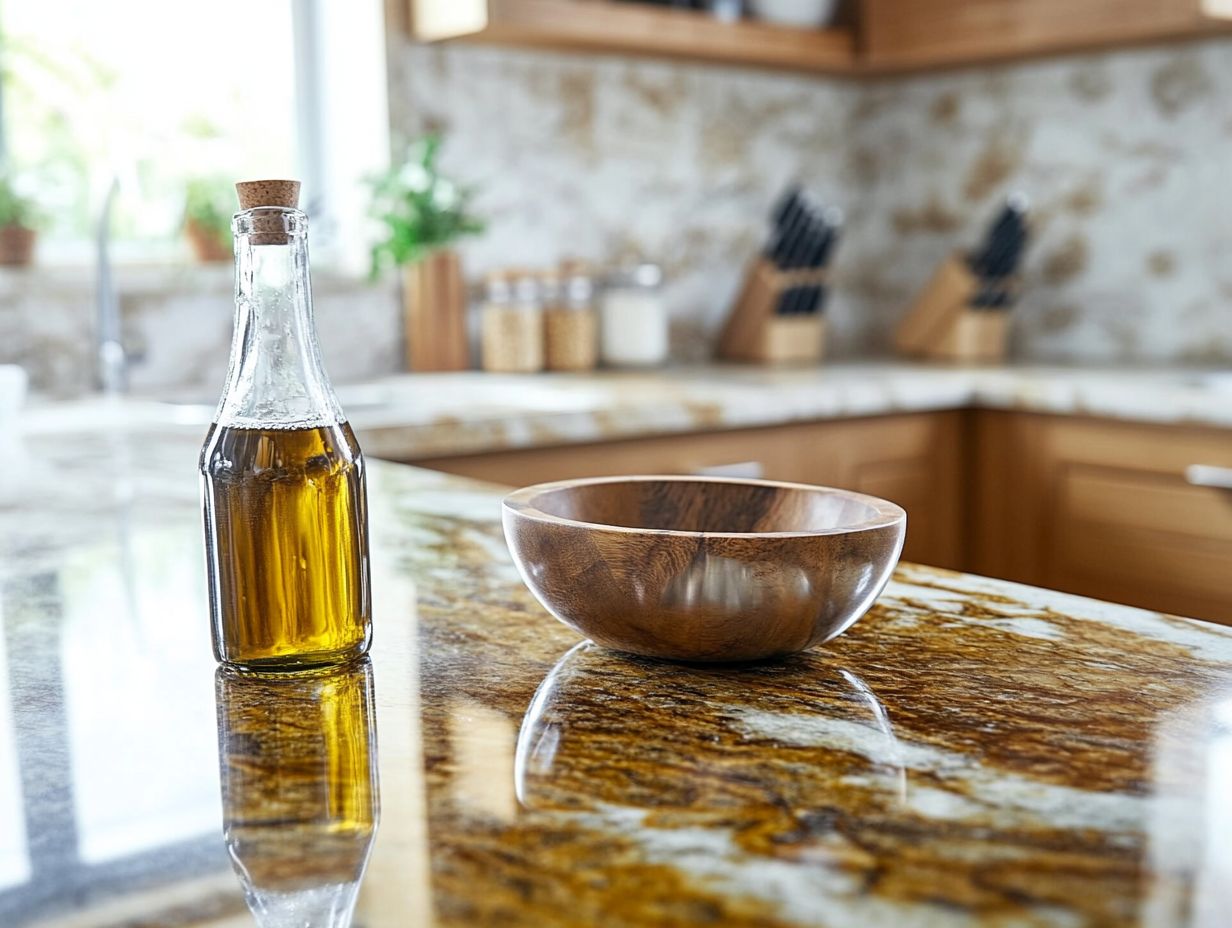
Jolie Kerr, a cleaning expert, and Caylin Harris, a home care advisor, have shared their extensive insights on utilizing vinegar for effective home cleaning. Their articles have been featured in New York Times, GQ, Cosmopolitan, Town & Country, Better Homes & Gardens, Family Circle, Rachael Ray Every Day, and Good Housekeeping.
Is Vinegar Safe for All Cleaning Surfaces?
Yes, vinegar is generally safe to use on many surfaces, including countertops, floors, glass, mirrors, and wood. However, there are some exceptions and precautions that should be taken.
Start cleaning with vinegar today! Share your own tips in the comments below.
What types of surfaces can vinegar be used on?
Vinegar can be used on many surfaces including countertops, floors, and glass. It is safe for most types of fabrics.
Are there any surfaces that should not be cleaned with vinegar?
Yes, avoid using vinegar on natural stones like marble and granite. It can also damage electronic screens and rubber gaskets.
Is vinegar safe to use around children and pets?
Yes! Vinegar is a natural, non-toxic cleaner, making it safe around children and pets. Always keep it out of reach and test a small area first.
Can vinegar damage surfaces over time?
Yes, frequent use of vinegar on certain surfaces can cause damage. Dilute vinegar with water to minimize risks.
Are there precautions to take when using vinegar?
Avoid using undiluted vinegar and always test a small area first. Store it in a cool place and keep it away from children.
Additionally, avoid mixing vinegar with other cleaning products, especially those containing bleach or ammonia. Use vinegar in well-ventilated areas and consider non-acidic cleaner alternatives for specific tasks.

